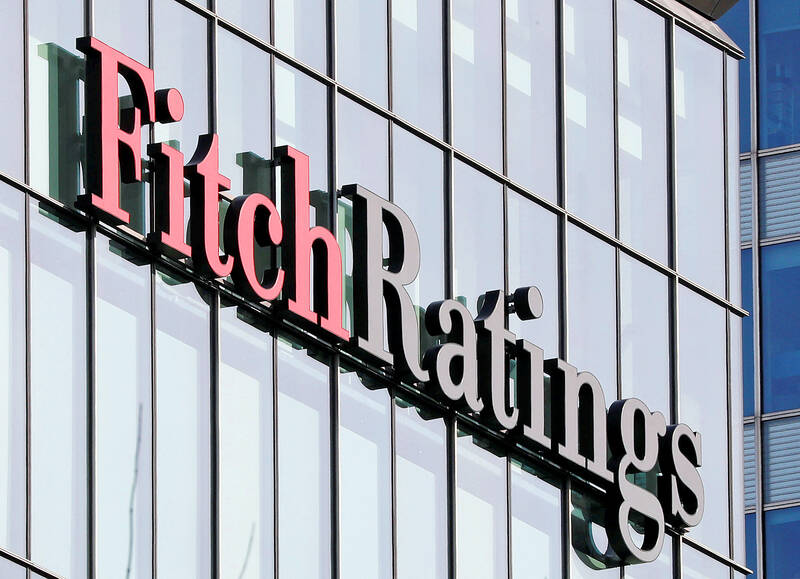Taiwan’s GDP would expand 3.2 percent this year, from 1.3 percent last year, Fitch Ratings said yesterday, posing a stable operating environment and business outlook for domestic banks.
“We expect the operation environment to be stable this year, supported by a recovery in external demand despite weak economic growth in the US and China, Taiwan’s top two trading partners,” Fitch credit analyst Cherry Huang (黃嬿如) said yesterday.
External demand is picking up thanks to an upturn in the technology cycle, the analyst said, adding that artificial intelligence applications are boosting exports and capital expenditure at semiconductor manufacturers.

Photo: Reuters
The central bank’s interest rate hike of 12.5 basis points in March would have limited impact on borrowers’ repayment ability, while low unemployment, improving GDP and moderate inflation should mitigate asset-quality deterioration despite a gradual unwinding of COVID-19-related loans, Fitch said.
The rate hike should also have limited impact on banks’ interest margins and loan quality, it said.
Fitch does not expect further policy rate hikes, as the central bank would keep interest rates at current levels for the rest of this year, the analyst said.
Rather, the agency is looking at a rate cut of 25 basis points next year to reverse the effect of monetary tightening this year and last year, Huang said.
Against that backdrop, Fitch assigned a “stable” outlook on Taiwan’s private banks on the expectation that their credit profiles would hold steady.
The rating suggests solid business and financial performance and manageable risk profiles, although lenders are likely to see a modest increase in impaired-loan ratios, from the unwinding of pandemic-related loans and offshore lending, analyst Sophia Chen (陳怡如) said.
Core profitability should hold steady this year, supported by consistent growth in lending and fee income and moderate credit costs, Chen said.
Most banks last year reported flat or improving profitability, with low credit costs and higher trading income.
The impact linked to international accounting rule changes on capitalization next year would be modest, and system liquidity would remain ample in local currency and US dollar terms, Chen said.
Ratings upside is also limited in the absence of major improvements in the banks’ franchises, profitability and capitalization, Chen said, adding that the scenario’s chance is dim, given Taiwan’s highly fragmented and competitive banking sector.
Taiwan banks’ credit profiles depend much on the resilience of their property assets in light of their high exposure to the real-estate sector, Fitch added.
Residential mortgage exposures climbed 7 percent over the past five years while commercial real-estate exposure grew 9 percent, helped by reshoring activity, despite unfavorable measures to cool the market, Fitch said.
“We expect regulators to remain vigilant about property loan concentration risks,” Fitch said, calling such risks “manageable” at present.

MULTIFACETED: A task force has analyzed possible scenarios and created responses to assist domestic industries in dealing with US tariffs, the economics minister said The Executive Yuan is tomorrow to announce countermeasures to US President Donald Trump’s planned reciprocal tariffs, although the details of the plan would not be made public until Monday next week, Minister of Economic Affairs J.W. Kuo (郭智輝) said yesterday. The Cabinet established an economic and trade task force in November last year to deal with US trade and tariff related issues, Kuo told reporters outside the legislature in Taipei. The task force has been analyzing and evaluating all kinds of scenarios to identify suitable responses and determine how best to assist domestic industries in managing the effects of Trump’s tariffs, he

TIGHT-LIPPED: UMC said it had no merger plans at the moment, after Nikkei Asia reported that the firm and GlobalFoundries were considering restarting merger talks United Microelectronics Corp (UMC, 聯電), the world’s No. 4 contract chipmaker, yesterday launched a new US$5 billion 12-inch chip factory in Singapore as part of its latest effort to diversify its manufacturing footprint amid growing geopolitical risks. The new factory, adjacent to UMC’s existing Singapore fab in the Pasir Res Wafer Fab Park, is scheduled to enter volume production next year, utilizing mature 22-nanometer and 28-nanometer process technologies, UMC said in a statement. The company plans to invest US$5 billion during the first phase of the new fab, which would have an installed capacity of 30,000 12-inch wafers per month, it said. The

Taiwan’s official purchasing managers’ index (PMI) last month rose 0.2 percentage points to 54.2, in a second consecutive month of expansion, thanks to front-loading demand intended to avoid potential US tariff hikes, the Chung-Hua Institution for Economic Research (CIER, 中華經濟研究院) said yesterday. While short-term demand appeared robust, uncertainties rose due to US President Donald Trump’s unpredictable trade policy, CIER president Lien Hsien-ming (連賢明) told a news conference in Taipei. Taiwan’s economy this year would be characterized by high-level fluctuations and the volatility would be wilder than most expect, Lien said Demand for electronics, particularly semiconductors, continues to benefit from US technology giants’ effort

‘SWASTICAR’: Tesla CEO Elon Musk’s close association with Donald Trump has prompted opponents to brand him a ‘Nazi’ and resulted in a dramatic drop in sales Demonstrators descended on Tesla Inc dealerships across the US, and in Europe and Canada on Saturday to protest company chief Elon Musk, who has amassed extraordinary power as a top adviser to US President Donald Trump. Waving signs with messages such as “Musk is stealing our money” and “Reclaim our country,” the protests largely took place peacefully following fiery episodes of vandalism on Tesla vehicles, dealerships and other facilities in recent weeks that US officials have denounced as terrorism. Hundreds rallied on Saturday outside the Tesla dealership in Manhattan. Some blasted Musk, the world’s richest man, while others demanded the shuttering of his